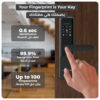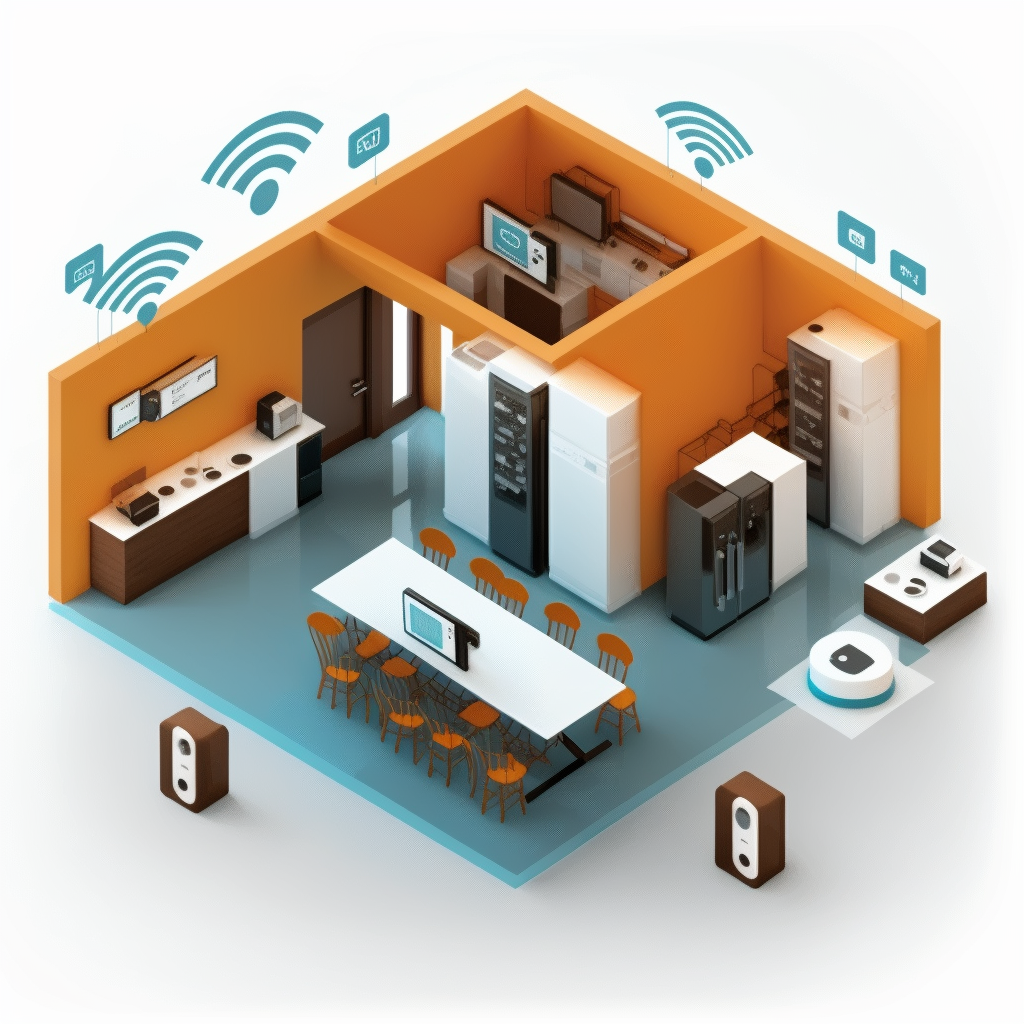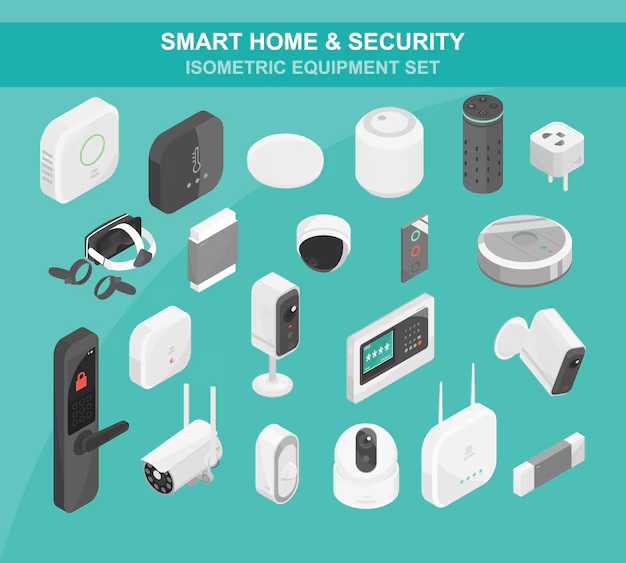Table of Contents
Unlocking the Truth: Are Smart Door Locks a Safe Choice for Your Front Door?

Photo by TheRealDonDiesel on Pixabay
Introduction to smart door locks
In the age of advancing technology, smart door locks have become an increasingly popular choice for homeowners looking to enhance the security and convenience of their homes. With the ability to control and monitor access to your front door from anywhere in the world, these innovative devices offer a range of benefits that traditional locks simply cannot match. In this article, we will explore the world of smart door locks, debunk common misconceptions, understand how they work, and discuss the factors you should consider before installing one. By the end, you will be equipped with the knowledge to make an informed decision about whether a smart door lock is the right choice for your front door.
The benefits of using smart door locks
One of the primary advantages of using a smart door lock is the convenience it provides. With a traditional lock, you often find yourself fumbling for keys, especially when your hands are full. With a smart lock, all you need is your smartphone or a key code to unlock your front door. This means no more searching for keys or worrying about losing them. Additionally, many smart door locks offer features such as remote access, allowing you to lock or unlock your door from anywhere using your smartphone. This is particularly useful if you need to let someone into your home while you are away or if you forget to lock the door on your way out.
Another benefit of smart door locks is the enhanced security they offer. Traditional locks can be vulnerable to lockpicking or unauthorized key duplication. Smart door locks, on the other hand, utilize advanced encryption and authentication methods to ensure that only authorized individuals can access your home. Additionally, many smart locks have built-in alarm systems that can alert you to any suspicious activity or attempted break-ins. These features provide peace of mind and an added layer of protection for you and your family.
Common misconceptions about smart door locks
Despite their many advantages, smart door locks are not without their share of misconceptions. One common misconception is that smart door locks are easily hackable, leaving your home vulnerable to intruders. This is simply not true. Smart door locks employ encryption protocols that make it extremely difficult for hackers to gain access. Furthermore, most smart locks have built-in security features, such as two-factor authentication, that provide an extra layer of protection against unauthorized access.
Another misconception is that smart door locks are prone to technical glitches and malfunctions. While it is true that no technology is perfect, smart door locks are designed to be reliable and secure. They undergo rigorous testing and adhere to industry standards to ensure their functionality and durability. It is important to choose a reputable brand and read customer reviews before making a purchase to minimize the risk of encountering any issues.
How do smart door locks work?
Smart door locks utilize a combination of hardware and software to provide secure access to your home. The hardware component consists of the lock mechanism itself, which is typically motorized and capable of both locking and unlocking the door. The software component includes the mobile app or control panel that allows you to interact with the lock, as well as the encryption protocols that ensure secure communication between the lock and your smartphone or other devices.
When you approach your front door, the smart lock can detect your presence through various means, such as Bluetooth or Wi-Fi signals. Once it verifies your identity, either through a key code or biometric authentication, the lock will unlock, allowing you to enter your home. Similarly, when you leave, the lock can automatically lock behind you, ensuring that your front door is always secure.
Factors to consider before installing a smart door lock
Before installing a smart door lock, there are several important factors to consider. First and foremost, you need to evaluate the compatibility of the smart lock with your existing door and lock mechanism. Some smart locks are designed to be retrofitted onto standard doors, while others require professional installation or may only be compatible with certain types of doors.
You should also consider the power source for the smart lock. Some locks are battery-powered, while others can be connected to your home’s electrical system. Battery-powered locks offer the advantage of being unaffected by power outages, but they require regular battery replacements. On the other hand, locks connected to your home’s electrical system may need professional installation and be vulnerable to power outages.
Additionally, it is crucial to assess the security features of the smart lock. Look for locks that utilize strong encryption protocols and have undergone independent security testing. Consider whether the lock offers two-factor authentication or other additional security measures. It is also worth investigating the manufacturer’s reputation and customer support, as this can impact the overall reliability and security of the lock.
Are smart door locks safe?
The safety of smart door locks is a common concern among homeowners considering their installation. While no security measure is foolproof, smart door locks are generally considered to be safe and secure when used correctly. As mentioned earlier, smart locks employ encryption protocols that make it difficult for hackers to gain unauthorized access. They also often have built-in alarm systems and tamper-detection features that can deter potential intruders.
However, it is worth noting that no technology is entirely immune to vulnerabilities. It is crucial to follow best practices for securing your smart door lock, such as regularly updating the lock’s firmware and using strong, unique passwords. Additionally, it is important to be mindful of the security of the devices that are connected to your smart lock, as a compromised device could potentially compromise the security of the lock itself.
Comparing different types of smart door locks
When it comes to smart door locks, there are several different types to choose from, each with its own set of features and advantages. The most common types include keypad locks, fingerprint locks, Bluetooth locks, and Wi-Fi locks.
Keypad locks are perhaps the most straightforward option, allowing you to unlock your door using a unique code. They offer convenience and can be easily shared with trusted individuals, such as family members or service providers. Fingerprint locks, on the other hand, utilize biometric authentication to grant access. They offer a high level of security and eliminate the need for keys or codes. However, they can be more expensive and may require additional setup.
Bluetooth locks rely on Bluetooth technology to communicate with your smartphone. They offer convenience and can automatically unlock your door when you approach. However, they have limited range and require your smartphone to be in close proximity to the lock. Wi-Fi locks, on the other hand, connect to your home’s Wi-Fi network, allowing you to remotely control and monitor your lock from anywhere. They offer the highest level of convenience but may require a stable Wi-Fi connection and can be more susceptible to hacking.
Best practices for securing your front door with a smart lock
While smart door locks offer enhanced security, it is important to follow best practices to ensure that your front door remains secure. Here are some tips to consider:
- Regularly update the lock’s firmware. Manufacturers often release firmware updates to address security vulnerabilities. Make sure to keep your lock’s firmware up-to-date to ensure you have the latest security patches.
- Use strong, unique passwords: Avoid using easily guessable passwords and consider using a password manager to generate and store strong passwords for your smart lock.
- Enable two-factor authentication: If your smart lock supports it, enable two-factor authentication for an additional layer of security. This typically involves verifying your identity through a second method, such as a fingerprint or a unique code sent to your smartphone.
- Secure your smartphone and other connected devices: Ensure that your smartphone and any other devices connected to your smart lock are protected with strong passwords and up-to-date security software.
- Regularly review access permissions. If you grant temporary access to individuals, such as house guests or service providers, make sure to revoke their access once it is no longer needed.
Tips for choosing the right smart door lock for your needs
With the wide range of smart door locks available on the market, choosing the right one for your needs can be a daunting task. Here are some tips to help you make an informed decision:
- Consider compatibility: Ensure that the smart lock you choose is compatible with your existing door and lock mechanism. Some locks require specific door types or professional installation.
- Evaluate security features: Look for locks that utilize strong encryption protocols and have undergone independent security testing. Consider additional security features, such as two-factor authentication or tamper detection.
- Assess power source options: Determine whether you prefer a battery-powered lock or one that is connected to your home’s electrical system. Consider the advantages and disadvantages of each option.
- Read customer reviews: Research the reputation of the lock manufacturer and read customer reviews to gain insights into the reliability, functionality, and customer support of the lock.
- Seek professional advice if needed. If you are unsure about the installation or compatibility of a smart lock, consider consulting with a professional locksmith or a smart home specialist.
Conclusion: Making an informed decision about smart door locks
In conclusion, smart door locks offer a range of benefits and conveniences that make them an attractive option for homeowners looking to enhance the security of their front doors. They provide convenience, enhanced security, and remote access control. While there may be common misconceptions and concerns about the safety of smart locks, when used correctly and with proper security measures in place, they are generally considered to be safe and secure.
When choosing a smart door lock, it is important to evaluate compatibility, security features, power source options, and customer reviews. By considering these factors and following best practices for securing your smart lock, you can make an informed decision and enjoy the added convenience and peace of mind that smart door locks offer.
So, if you are looking to upgrade your front door’s security and convenience, consider exploring the world of smart door locks. With the right choice and proper installation, you can unlock the potential of these innovative devices and enjoy a safer and more convenient home.





